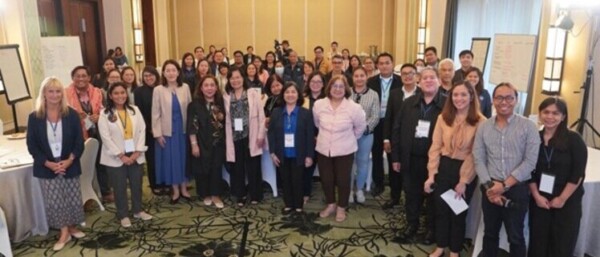
Reflections on the knowledge exchange forum on competency standards development in the Philippines
 Jane Rexworthy, Executive Director at People 1st International
Jane Rexworthy, Executive Director at People 1st International
‘Designing a dynamic, flexible, agile and responsive system for industries and learners’ was the key theme at the Skills for Prosperity Knowledge Exchange Forum workshop in Manila this August.
Joining the event to hear an exchange on best practices and lessons learned from countries including the UK and the Philippines, over 80 participants tuned in to discuss the use of labour market data to assess skill needs, institutional frameworks and governance frameworks for successful industry involvement, and monitoring and quality assurance approaches to demand-driven competency standards development.
To set the scene, introductions from esteemed speakers kicked off the forum including Mr. Suharto Mangudadatu, Director-General, TESDA; Mr. Khalid Hassan, Director of ILO Country Office Manila; Ms. Leonina Morillo, Head of Social and Economic Development at the British Embassy in the Philippines; Ms. Justine Raagas, Executive Director of Philippine Business for Education.
As a speaker and moderator at the forum, it was encouraging to hear the level of collaboration between government and industry during the workshop, which aimed to accomplish the following goals:
- Discuss successful methods and lessons learned from the UK and the Philippines regarding working with business to set competency standards in construction, information technology, and agriculture.
- Offer a forum for UK and Philippine industry representatives to share knowledge with TVET practitioners in the Philippines, as well as an opportunity for everyone to discuss how to create a competency standard development process that is demand driven.
- Discuss effective methods for government and business partnership by highlighting UK and Philippine examples of finance models for the development of competency standards and governance procedures.
- Encourage more interaction between industry professionals, supporters, and TVET institutions working on design and development.
Some important observations by the presenters framed the context from within which the discussions advanced:
- This is a shared journey, it is the future of work, and economic growth for the Philippines.
- The importance of human capital cannot be overstated; fair and equal access to TVET will ensure a talented and capable labour force as well as a migratory workforce.
- The Philippines’ future social and economic prosperity as it climbs towards middle-income status depends on lifelong learning and accelerated learning.
- Industry and TESDA collaboration is essential for public-private partnerships.
The newly launched National Technical Skills Development Plan 2023-2028, which is closely related to the labour employment plan, was also urged upon the delegates.
The outputs from the workshop emphasised key findings and suggestions for enhancing capability including overcoming obstacles in the development of competency standards. Key takeaways include:
- The necessity of competency standards in all industries was stressed at the event by industry representatives from TESDA and other stakeholders. The workshop participants noted the gaps and difficulties in creating competency criteria including the lack of competency-based standards experts with the urgency to increase capacity and give professionals training.
- Delegates stressed the importance of training industry sector skills councils and recognised industry bodies to develop competency-based standards. They also highlighted the importance of training industry professionals to develop competency standards and establishing task groups within industry who would take responsibility for pulling experts together to improve quality and consistency. The delegates emphasized the role of TESDA in supporting and assuring the quality of industry standards.
- Forecasting skills is key to the development of new or amended competency-based standards. The industry boards and sector skills councils will need to advocate for robust regular forecasting of skills using government statistics and qualitative/quantitative evidence to identify the need for new or amended competency standards.
- As TESDA funds the development of competency standards, particularly in priority sectors a key recommendation is to outline various financing mechanisms, including honoraria for experts and industry contributions.
In conclusion and as a lasting legacy of the Skills for Prosperity project funded by UK Foreign, Commonwealth & Development Office and managed by ILO, it will be important to continue to address the challenges discussed in the workshop in developing competency-based standards. This is the opportune time as there is a genuine willingness from all stakeholders including industry, TESDA and skills experts to continue their collaboration to overcome these challenges and ultimately improve the current and future workforce in the Philippines.



